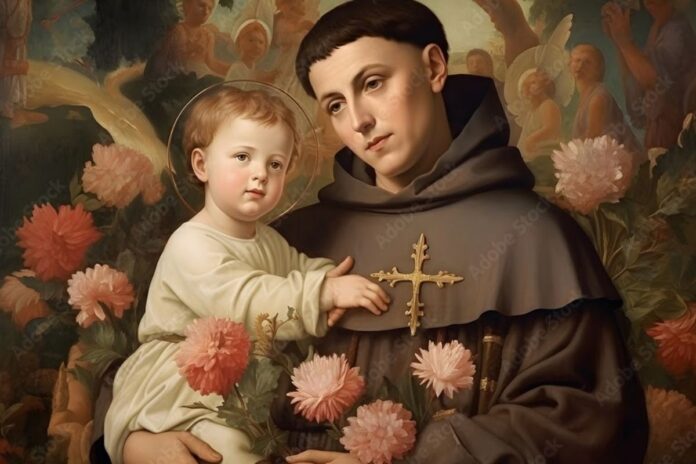Anthony of Padua, also known as Anthony of Lisbon, was born Fernando Martins de Bulhões on 15 August 1195 and died on 13 June 1231. He was a Portuguese Catholic priest and a prominent member of the Order of Friars Minor. Born into a wealthy family in Lisbon, Portugal, Anthony is renowned for his powerful preaching, deep knowledge of scripture, and unwavering devotion to the poor and the sick. His preaching and teachings were so impactful that he became one of the most quickly canonized saints in Church history, being canonized less than a year after his death.
Introduction
Saint Anthony of Padua, one of the most beloved saints in Catholic history, is revered not only for his exceptional preaching and scholarly works but also for the countless miracles attributed to him. A Franciscan friar, theologian, and missionary, his devotion and compassion have left a lasting legacy on the Church and its followers. In this article, we’ll explore the fascinating life of Saint Anthony, his miracles, and how his teachings continue to inspire millions around the world. Whether you’re curious about his biography or seeking inspiration from his faith, this guide will shed light on his timeless impact.
Early Life and Call to Faith
Born in Lisbon, Portugal
Saint Anthony of Padua was born as Fernando Martins de Bulhões in 1195 in Lisbon, Portugal. From a young age, he showed remarkable intelligence and a deep devotion to the Christian faith. His early education took place in the Abbey of Saint Vincent, where he learned Latin and Scripture, which would later shape his work as a preacher and theologian.
Joining the Franciscan Order
At the age of 15, Fernando entered the Augustinian order, but his life took a significant turn when he encountered the remains of Franciscan martyrs. Moved by their story, he decided to join the Franciscans, adopting the name Anthony. His decision to leave behind a life of comfort to serve God in the Franciscan order highlights his unwavering dedication to the faith.
Preaching and Miracles
The Powerful Preacher
Saint Anthony was not only a man of deep faith but also an extraordinary preacher. His sermons were known for their clarity and passion, attracting large crowds. He had a unique ability to bring the Gospel to life, making complex theological concepts accessible to all. His love for God and his profound understanding of Scripture made him a sought-after speaker across Europe.
Miracles and Divine Intervention
Throughout his life, Saint Anthony was believed to have performed countless miracles. From healing the sick to restoring lost items, his reputation as a miracle worker spread far and wide. One of the most famous stories involves his ability to restore a stolen book of Psalms to a young novice who had run away. In addition to healing the sick, Saint Anthony was known for his power to cast out demons, an attribute that earned him widespread recognition as a protector of the faithful.
Patronage and Legacy
Patron of Lost Things
Saint Anthony is famously known as the patron saint of lost things. Many people turn to him in times of despair when something important goes missing. It is said that his intercession has led to the miraculous recovery of lost items, which further contributed to his growing reputation.
Saint Anthony’s Influence on Art and Culture
Throughout history, Saint Anthony has been depicted in various forms of art, from paintings to sculptures. His image is often shown with the Christ child in his arms, a symbol of his deep spirituality. Additionally, many churches around the world are named after Saint Anthony, and his feast day on June 13th is celebrated with great reverence.
FAQ
1. Why is Saint Anthony of Padua so important?
Saint Anthony is important because of his deep spirituality, powerful preaching, and the many miracles attributed to him. He helped spread the teachings of the Catholic Church, and his intercession is believed to have helped countless people throughout history.
2. What miracles are attributed to Saint Anthony?
Saint Anthony is credited with numerous miracles, including healing the sick, restoring lost items, and casting out demons. One of the most famous stories involves him restoring a stolen book of Psalms.
3. How did Saint Anthony become a saint?
Saint Anthony was canonized as a saint in 1232, just a year after his death. His life of service, preaching, and miracles led to his swift recognition as a saint by the Catholic Church.
4. When is Saint Anthony’s feast day?
Saint Anthony’s feast day is celebrated on June 13th, the anniversary of his death. It is a day marked by special prayers and celebrations in his honor.
Final Thoughts
Saint Anthony of Padua’s life and legacy continue to inspire Christians around the world. His deep faith, commitment to the Gospel, and countless miracles have made him one of the most beloved saints in history. Whether you are seeking inspiration, looking for help in finding lost items, or simply learning about his life, Saint Anthony’s story is one of hope, devotion, and miraculous power. His teachings and example remind us of the strength of faith and the importance of compassion, making him a timeless figure in both religious and cultural history.




